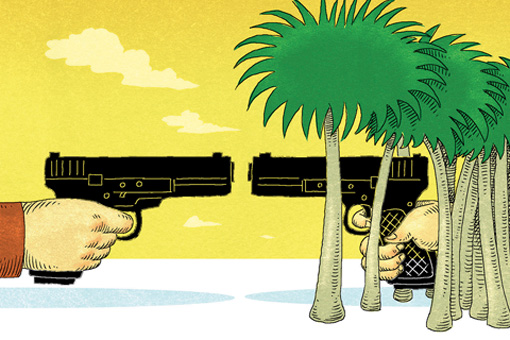The current dialogue between the Colombian government and the FARC has no chance of ending in a definitive peace agreement. Various factors threaten its success: the guerrillas’ arrogant and demanding negotiating style, the lack of public support for the talks and sheer time constraints.
Since the peace talks began in Havana, the FARC has sabotaged any hope of progress. Many of its demands regarding key issues—like agrarian reform, control of national territory and the insistence on keeping its arms—simply cannot and will not be met by the Colombian government, primarily because the talks—and the FARC itself, with a 2 percent approval rating among Colombians—lack political legitimacy.
The barriers to agreement were obvious soon after the process began. The FARC failed to fulfill its initial commitment to limit the dialogue to only six key topics, which was a condition of sitting down at the table. Instead, it has been endlessly expanding the agenda and bringing myriad proposals and demands to the table, slowing negotiations to a crawl.
In effect, the peace talks have been used by the farc to gain the kind of political leverage that it failed to win on the battlefield. Despite political unpopularity and shrinking military influence (guerrilla forces were reduced by half as a result of former President Álvaro Uribe’s security policy), the FARC believes the government needs the talks more than the guerillas do. As the country gears up for elections in 2014, President Juan Manuel Santos needs to show progress in what was a cornerstone of his campaign platform: bringing to an end Colombia’s long internal conflict. The FARC’s perceived upper hand has guided the group to pursue an aggressive negotiation strategy.
For example, FARC negotiators presented some 110 proposals regarding comprehensive agrarian reform—many of them, such as the demand for demilitarization of the countryside to lay the groundwork for such reform, are simply unrealistic. The demand would have meant reducing the military budget and the size of the Colombian armed forces, and revising the state’s military doctrine. If the Santos government conceded that point, it would have effectively removed the army as a presence in rural areas—an obvious deal-breaker.
Just as far-fetched are FARC demands for major revisions to existing mining, energy and foreign investment policies, as well as reform of the 11 bilateral free trade treaties that Colombia has signed.
But the demands don’t stop there. Perhaps the guerrillas’ most audacious demand is one that gives the FARC control of 40 percent of the national territory through the creation of rural reserve zones and other territorial divisions. According to the proposal, these zones would have full economic, fiscal, judicial, and cultural autonomy and be completely demilitarized. Under such a plan, Colombian national territory would be fractured—something the Colombian government clearly will never accept.
Moreover, the FARC maintains that it should be granted total impunity, allowing it to escape prosecution for human rights abuses. This idea has been rejected by the vast majority of the public, human rights NGOs and the attorney general. Although the Santos government pushed through constitutional reform guaranteeing impunity to bring the guerrillas to the negotiating table, the International Criminal Court (ICC) made clear it would refuse to recognize any such guarantees. Citing Colombia’s position as a signatory of the 2002 Rome Statute, which empowered the ICC to investigate crimes against humanity, genocide, war crimes, and crimes of aggression, the court has warned that it would intervene. For the time being, the two positions seem irreconcilable. But no peace agreement is possible unless this is addressed.
Another obstacle is the arms issue. The FARC made it clear it will not disarm until the Colombian state has complied with all of the provisions agreed upon in the eventual peace accord. Government spokespeople say that even if this condition were accepted, disarmament would take at least 10 years. Effectively, that means the guerrilla group would maintain its weapons, leaving Colombia in a state of armed peace and effectively holding the government hostage to the FARC’s judgment about whether it has upheld its side of the bargain.
If the government agreed to this, it would be defying public opinion. According to polls, the vast majority of Colombian citizens insist on the FARC’s total disarmament as a condition of the peace treaty and reject any agreement that would allow the guerrillas to maintain both their weapons and their political leverage.
The FARC is aware that even in the unlikely situation that the country’s political leadership concedes to demands for impunity, control of territories, radical Castro- or Chávez-style economic reforms, and unfettered possession of arms, the Colombian people will not. For this reason, it wants the agreed-upon points to be voted on by a constituent assembly, and—if passed—incorporated in the Constitution. Their hope is that in a constituent assembly charged with amending the Constitution, they would enjoy more support than in a popular referendum, which the Santos government prefers. The FARC has warned that if the government does not agree to a constituent assembly, the armed conflict will continue. To apply pressure to negotiations, the FARC has resorted to a campaign of sabotage, hostage-taking, extortion, and terrorism.
Despite the surge in violence, the government has not walked away from the negotiating table. Santos’ political future largely depends on the success of the peace talks, since his approval rating has dropped to 21 percent. The government has ignored the FARC’s more onerous demands, while spreading the illusion that a deal could be reached in just a few months. Most Colombians don’t believe it.
The campaigns for parliamentary and presidential elections will begin in a few months. With guerrilla violence and public skepticism (and fatigue) rising, it’s unlikely that the government will risk any unpopular concessions at the negotiating table during the electoral season. If the declining popular support for the Santos administration doesn’t torpedo the peace talks, the FARC’s overly-ambitious demands certainly will.



